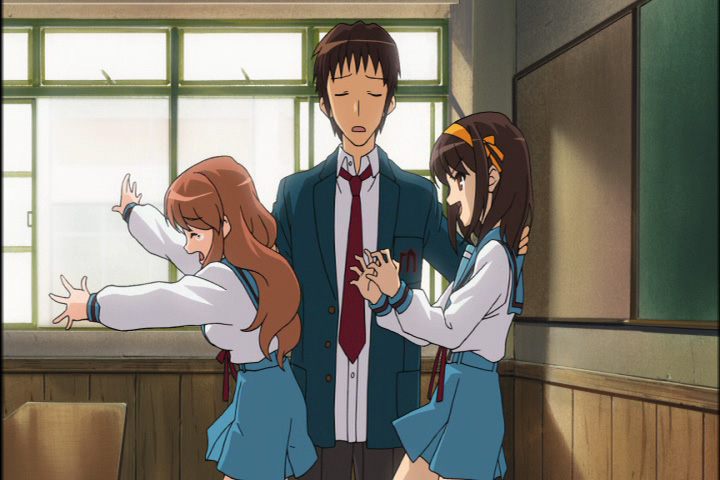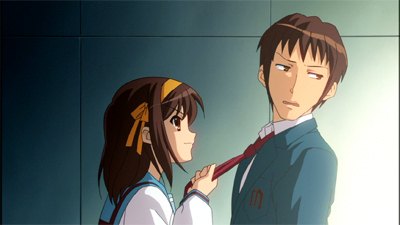"Why live in the world when you can live in your head?"
A lot of people who claim to out-and-out hate anime usually have a fairly good reason for that: a lot of anime is derivative of other, more succesfull anime. Granted, this is just like any industry, where the cool thing is immediately cl oned and recycled over and over until its neither fashionable nor in vogue. (DISCUSS.) If there is anything special about this practice as it applies to anime, it's likely the specialty aspect of the product, that it comes from japan, that it's animated, that it contains identifable style characteristics. To the uninitiated, all magical girls, for instance, may look alike. A Sailor Scout is as good as a Magical Knight Rayearth, etc. Hell, to the initiated it can all get a little bit hazy.
oned and recycled over and over until its neither fashionable nor in vogue. (DISCUSS.) If there is anything special about this practice as it applies to anime, it's likely the specialty aspect of the product, that it comes from japan, that it's animated, that it contains identifable style characteristics. To the uninitiated, all magical girls, for instance, may look alike. A Sailor Scout is as good as a Magical Knight Rayearth, etc. Hell, to the initiated it can all get a little bit hazy.
Every once in a while, though, something truly special comes along, an anime series that not only sets itself apart content-wise, but that does so by taking familiar genres and twisting them into imaginative new contortions. Think of how FLCL warped post-Evangelion giant robot conventions into a hormonal metaphor for teenage angst, and you might start to get an idea of what The Melancholy of Haruhi Suzumiya does to all kinds of shoujo fantasy subgenres.
An anime series made specifically for otaku usually fares no better than moderately well, as targeting it at whatever niche market it panders to inherently limits its potential appeal. Every so often, though, one finds just the right tone, or puts together just the right combination of gimmicks, to break beyond its limitations and become a smashing success. In 2006 that series was the megahit The Melancholy of Haruhi Suzimiya (hereafter MoHS), whose intrinsic oddity, bold characters, strong technical merits, and boatload of fan-pleasing gimmickry have won it immense popularity (or notoriety, depending on your point of view) in fan communities on both sides of the Pacific. Even its marketing campaign has been quite far off the beaten path, but one would expect nothing less from one of the most eccentric titles in recent years .
.
MoHS wastes no time in revealing its eccentricities. Episode 00, which starts off the series, is actually composed of a grainy, deliberately amateurish film which features key cast members playing out a disjointed and horribly clichéd story narrated in off-the-cuff fashion by the one main character we don't see in it; all part of a project made for a school festival, we later discover, and the reactions of the cast members to seeing the completed film are classic. To open a series with something so deliberately bad that it's funny may be risky, but it certainly caught the attention of fandom. The real story actually begins with the second episode, which is numbered Episode 01. Though a person could actually entirely skip the first episode and not miss anything important to the plot, the novelty of the experience would be lost, as would an appreciation for the cleverness of the foreshadowing used in it; one of the conceits of the first episode, which only becomes apparent later on, is that the roles the key cast members play in the film are actually uncannily close to their true natures. Another oddity came in the fourth broadcast episode, which originally jumped ahead to episode 7.
Some of the series' charm also comes from the way it skewers assorted anime conventions and fandom peculiarities without exactly parodying them. It toys with the current Japanese otaku fascination with moe in the same way that a cat plays with a ball of yarn, addresses the “girl with glasses” fetish in two different ways, and unabashedly puts its two female leads in bunny costumes for the explicit purpose of exploiting sex appeal to gain attention. Its use of fan service carries a different feel from most other series, partly because it does not resort to the stereotypical tawdry reactions normally seen in more risqué anime comedies.
anime comedies.
Most importantly, it revels in finding clever ways to explain the inclusion of fan-fave elements like psychics, aliens, time-travelers, and (for all practical purposes) gods in a normal high school setting. There are even hints of an underlying romance, as Haruhi's actions subtly suggest that her deigning to carry on conversations with the completely normal Kyon, and getting him involved in her schemes, may have deeper implications.
For all its slick use of story oddities, though, the central characters are the heart of the series' appeal. For decades anime titles have been replete with bold, assertive female leads that buck Japanese societal norms, but the title character here is in a class by herself. Rather than rely on partial insanity, hyperactivity, or stupidity, as most such heroines do, Haruhi achieves her dominance through sheer force of personality. She isn't crazy at all, as there is always a method to her seeming madness; she just has a unique world view, the audacity and aggressiveness to ruthlessly pursue it without being at all concerned with what others think, and apparently gets bored easily. Kyon, who also narrates, is at least as much of a delight as the low-key and somewhat cynical young man who increasingly finds himself mixed up in all the weirdness surroun ding Haruhi and seems to lack the means (and possibly desire?) to extricate himself from it. He gets to see the big picture that Haruhi misses, which provides a window onto Haruhi's world for the viewer to watch and experience. Other key characters, though they may seem stereotypical, hold their own surprises, such as the placid, soft-spoken bookworm Yuki, who delivers onto Kyon a mass of startling revelations; much-suffering Mikuru, who actually has her own secret agenda despite appearing to be totally at Haruhi's mercy; and congenial Itsuki, who actually is a “mysterious transfer student” because of his own ulterior motives. A couple of other characters who have appeared so far also have hidden identities, though they are not revealed in the early episodes.
ding Haruhi and seems to lack the means (and possibly desire?) to extricate himself from it. He gets to see the big picture that Haruhi misses, which provides a window onto Haruhi's world for the viewer to watch and experience. Other key characters, though they may seem stereotypical, hold their own surprises, such as the placid, soft-spoken bookworm Yuki, who delivers onto Kyon a mass of startling revelations; much-suffering Mikuru, who actually has her own secret agenda despite appearing to be totally at Haruhi's mercy; and congenial Itsuki, who actually is a “mysterious transfer student” because of his own ulterior motives. A couple of other characters who have appeared so far also have hidden identities, though they are not revealed in the early episodes.
Though many aspects of the series may provoke discussion, it is still, at heart, a humorous otaku funfest (albeit an extremely good one), and is best appreciated if one does not lose sight of that. Haruhi is nothing short of a roller coaster joyride. It offers many unforgettable moments that you’ll cherish, as well as times where you’ll come close to dying of laughter. With its fresh sense of humor, stylized picture and plot, and characters you’ll absolutely never forget, The Melancholy of Haruhi Suzumiya may very well be the anime that defined 2006.
Labels: Anime Review

a great review for a great anime! really like how you put your words coherently, in ways we can understand them!
mangamelody said...
July 6, 2009 at 4:49 AM